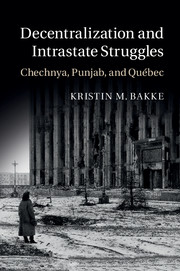Crossref Citations
This Book has been
cited by the following publications. This list is generated based on data provided by Crossref.
CEDERMAN, LARS-ERIK
HUG, SIMON
SCHÄDEL, ANDREAS
and
WUCHERPFENNIG, JULIAN
2015.
Territorial Autonomy in the Shadow of Conflict: Too Little, Too Late?.
American Political Science Review,
Vol. 109,
Issue. 2,
p.
354.
Seymour, Lee JM
Bakke, Kristin M
and
Cunningham, Kathleen Gallagher
2016.
E pluribus unum, ex uno plures.
Journal of Peace Research,
Vol. 53,
Issue. 1,
p.
3.
Basta, Karlo
2016.
Imagined Institutions: The Symbolic Power of Formal Rules in Bosnia and Herzegovina.
Slavic Review,
Vol. 75,
Issue. 4,
p.
944.
Lacina, Bethany
2016.
Who Opposes Ethnic Territorial Autonomy?.
SSRN Electronic Journal,
Clayton, Govinda
and
Thomson, Andrew
2016.
Civilianizing Civil Conflict: Civilian Defense Militias and the Logic of Violence in Intrastate Conflict.
International Studies Quarterly,
Vol. 60,
Issue. 3,
p.
499.
Saideman, Stephen M.
2017.
ELF Must Die: Institutions, Concentration, the International Relations of Ethnic Conflict and the Quest for Better Data.
Ethnopolitics,
Vol. 16,
Issue. 1,
p.
66.
Zamorano, Mariano M.
Rius-Ulldemolins, Joaquim
and
Bonet, Lluís
2018.
Autonomía y cooperación en los modelos federalizantes de política cultural. Análisis comparativo de los casos de Alemania, EEUU, Canadá, Suiza, Reino Unido y España.
Política y Sociedad,
Vol. 55,
Issue. 1,
p.
189.
Basta, Karlo
2018.
The State between Minority and Majority Nationalism: Decentralization, Symbolic Recognition, and Secessionist Crises in Spain and Canada.
Publius: The Journal of Federalism,
Vol. 48,
Issue. 1,
p.
51.
Rode, Martin
Pitlik, Hans
and
Borrella Mas, Miguel A´ngel
2018.
Does Fiscal Federalism Deter or Spur Secessionist Movements? Empirical Evidence from Europe.
Publius: The Journal of Federalism,
Vol. 48,
Issue. 2,
p.
161.
Okpanachi, Eyene
2019.
The Limits of Federation-wide Political Parties in Ensuring Federal Stability: Nigeria under the Peoples Democratic Party.
Publius: The Journal of Federalism,
Vol. 49,
Issue. 4,
p.
617.
Saith, Ashwani
2019.
Ajit Singh of Cambridge and Chandigarh.
p.
273.
Lacina, Bethany
2020.
Opposition to Ethnic Territorial Autonomy in the Indian Parliament.
Ethnopolitics,
Vol. 19,
Issue. 5,
p.
459.
Ottmann, Martin
2020.
Peace for our time? Examining the effect of power-sharing on postwar rebellions.
Journal of Peace Research,
Vol. 57,
Issue. 5,
p.
617.
Tan, Evrim
2020.
The Palgrave Encyclopedia of Peace and Conflict Studies.
p.
1.
Aprita Sari, Cut Maya
Suhail Ghifari, Muhammad
and
Talib @ Khalid, Kartini Aboo
2020.
TRANSACTIONAL POLITICAL PRACTICES IN THE ASYMMETRIC DECENTRALIZATION SYSTEM IN ACEH (10-YEAR ANALYSIS OF SPECIAL AUTONOMY FUND MANAGEMENT PERIOD 2008-2018).
Humanities & Social Sciences Reviews,
Vol. 8,
Issue. 3,
p.
1443.
Beiser-McGrath, Janina
and
Metternich, Nils W.
2021.
Ethnic Coalitions and the Logic of Political Survival in Authoritarian Regimes.
Comparative Political Studies,
Vol. 54,
Issue. 1,
p.
144.
Theuerkauf, Ulrike G.
2021.
Decentralisation and the Management of Ethnic Conflict: Lessons from the Republic of Macedonia, by Aisling Lyon, London, Routledge, 2016, xxii + 248 pp., £92.00 (hardcover), ISBN 9781138944114.
Nationalities Papers,
Vol. 49,
Issue. 2,
p.
392.
Rohrbach, Livia
2021.
Intra-party dynamics and the success of federal arrangements: Ethiopia in comparative perspective.
Regional & Federal Studies,
Vol. 31,
Issue. 4,
p.
475.
Vinson, Laura Thaut
and
Rudloff, Peter
2021.
Perceptions of Local versus National Factors in Religious and Tribal Conflict: Evidence from a Survey in Jos, Nigeria.
Politics and Religion,
Vol. 14,
Issue. 4,
p.
663.
Griffiths, Ryan D
2021.
Secessionist Strategy and Tactical Variation in the Pursuit of Independence.
Journal of Global Security Studies,
Vol. 6,
Issue. 1,





